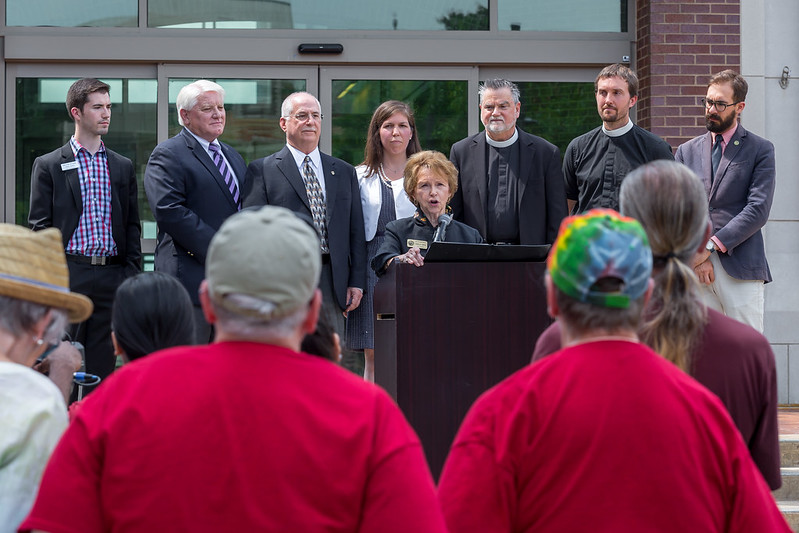
During the introduction of the city’s Uniform Civil Rights Protection ordinance, then-City Council member Adella Gray was joined by (from left) Chaz Allen, president of the NWA Center for Equality; Steve Clark, president of the Fayetteville Chamber of Commerce; Mark Martin, an attorney at the Martin Law Firm; Danielle Weatherby, Assistant Professor of Law at the University of Arkansas; Lowell Grisham, rector of St. Paul’s Episcopal Church; Clint Schnekloth, lead pastor at Good Shepherd Lutheran Church; and Matthew Petty, Fayetteville City Council member in Ward 2.
Photo: Todd Gill, Flyer staff
The Arkansas Supreme Court has ruled that Fayetteville cannot enforce its civil rights ordinance.
The law prohibits business owners and landlords from firing or evicting someone because of their sexual orientation or gender identity. Churches, religious schools and daycare facilities, and religious organizations are exempt from the ordinance.
A civil rights ordinance first passed in 2014 by the Fayetteville City Council, but petitioners delivered enough signatures to call for a repeal, which voters approved 52-48 in a special election.
State lawmakers, led by Sen. Bart Hester (R-Cave Springs), responded by passing the Intrastate Commerce Improvement Act (Act 137), which prevents cities from following Fayetteville’s lead by enacting protections not already mentioned by established state law.
The Arkansas Civil Rights Act prohibits discrimination on the basis of race, religion, national origin, gender and disability — but not sexual orientation or gender identity.
Fayetteville City Council members then brought forth a new law that provided those two protections, and sent it directly to voters, who approved the new measure 53-47.
The new law was challenged in 2016, but Washington County Circuit Judge Doug Martin ruled that the ordinance did not violate Act 137 because state law does mention sexual orientation and gender identity in several sections of the Arkansas Constitution, including policies related to anti-bullying, domestic violence shelters, and birth certificates.
Martin’s decision was appealed when Attorney General Leslie Rutledge and supporters of Act 137 disagreed with the ruling. The state Supreme Court eventually sided with Rutledge, but did not address what Williams has said is a glaring issue.
Williams has long argued that the intent of Act 137 was an obvious attempt to stop cities from providing protections for certain classes of people.
“If the legislature’s intent was to say cities cannot pass ordinances like ours that protect the rights of gays and lesbians then that is, in fact, unconstitutional,” Williams said shortly after the passage of Act 137.
He’d hoped to get some clarity on that argument in the latest hearing, but the court last week definitely reversed Martin’s original decision, effectively dismissing the case altogether.
Williams said he was taken aback by the court’s refusal to address his overarching argument.
“There is still an issue left, which is the constitutionality of Act 137 and whether or not it is a violation in itself,” Williams said on Tuesday. “So it was very surprising to us when the court assumed that we somehow could not argue that.”
Williams said he plans to file a petition for a re-hearing in the coming weeks.
“The Supreme Court needs to at least consider our argument. They can turn us down, but they should at least listen to us and not say that we don’t even have a chance to argue the constitutionality of the law that they say invalidates the uniform civil rights protection ordinance that was passed by the people.”
Mayor Lioneld Jordan addressed the issue during the City Council meeting on Tuesday.
“I want to thank the people of this city for standing up and voting for equality,” he said. “It was the right thing to do, and I am certainly disappointed by the decision of the Supreme Court last week. But we will continue to fight on.”

